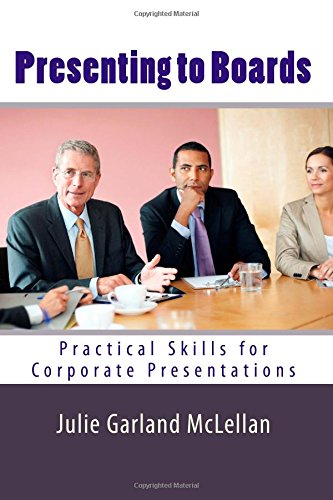 Book review - Presenting to Boards by Julie Garland McLellan.
Book review - Presenting to Boards by Julie Garland McLellan.
ISBN 978-145159406
A book of practical hints and tips for making successful board presentations.
Boardroom presentations can gain acceptance of new strategic proposals, make sales, or build shared understanding and common identities. They are important to career success. Board protocols, behaviours, and legal liabilities may be very different from those in executive life. Understanding the boardroom environment is fundamental to presentation success.
Most information on presenting is designed to help reluctant presenters to survive their ordeal. Very little is written or taught about how to excel and how to meet and surpass the expectations of highly discerning corporate audiences. Yet that is what boardroom presenters must do.
This book provides practical skills that will help you to make your boardroom presentations successful.
Available at Amazon.com in paperback and Kindle editions.
What's New - In September
 In September I had the joy of a trip to New Zealand to present a master class on Presenting to Boards and Senior Executives. This course is always a pleasure to present as the skills it develops are an immediate benefit to the participants and then a second benefit to their boards.
In September I had the joy of a trip to New Zealand to present a master class on Presenting to Boards and Senior Executives. This course is always a pleasure to present as the skills it develops are an immediate benefit to the participants and then a second benefit to their boards.
I stayed on in New Zealand for the Governance NZ Conference where I presented another real-life case study keynote. As always it was gratifying to see how quickly an alert group of governance professionals will pick up on the seeds of destruction long before they have taken a firm root. It was also a pleasure to meet the many governance professionals attending the conference; some boards are very well supported!
Another great experience last month was serving as MC for the Digital Strategy and Innovation Conference in Sydney. It was a privilege to take the stage with the presenters who had all managed significant scale transformation within established and well governed companies. Learning the keys to implementing disruptive change whilst protecting revenue, brand, staff, investors and profitability was a priceless value add to my fee for the work.
I am always keen to work more and will be delighted to hear from you if you would like to arrange some board education or a performance review!
Inspirational quote for October - This month my favourite quote is:
"Decide whether or not the goal is worth the risk involved. If it is, stop worrying."
~ Amelia Earhart ~
Tiffany needs to decide if she, and her board, wish to keep and support their CEO through the investigation and aftermath of this regrettable incident. If the board agree with her assessment that this is the first mistake and the CEO is one they wish to retain then she must be committed in her support through the following months.
Let's meet - I love the opportunity to meet readers (and anyone who is interested in governance) so it would be great to see you at one of my upcoming events that are open to the public:
-
Boardroom Ready Workshop for Konnect Learning in Sydney on 24 October
-
Taiwan Corporate Governance Association "Corporate Governance Summit XIII: Creating Corporate Value through Enhancing Functions of Board" in Taipei on 25 October followed by a masterclass workshop on 26 October.
If you would like me to speak for or train your board, staff, audience and/or group please contact me julie@mclellan.com.au.
A note on names - A few readers have asked me where I find the names for the protagonists in each case study. I can only say that I 'borrow' them from people I meet or things that I read. Tiffany is an old name with many (fiercely disputed) meanings. My favourite is 'epiphany'. Our protagonist will look back on the evens of the case study as a transformational period in her development as a board chair.
This newsletter - If you have any ideas for improving the newsletter please let me know. If you are reading a forwarded copy please visit my website and sign up for your own subscription.
Suggestions for dilemmas - Thank you to all the readers who have suggested dilemmas. I will answer them all eventually. I could not write this newsletter without your help and without the generous help of all the experts who respond each month to the case studies.
Be a contributor - if you would like to attempt a response to the dilemmas for publication you will be most welcome. Simply reply to this email and let me know.
Farewell until the next issue (due 1 November 2017). I look forward to greeting you again then. In the interim I hope you will enjoy health, happiness and hard work.
Enjoy governing your corporations; we are privileged to do what we do!
Best regards,
Julie
 Tiffany chairs a large government-sector company. It is subject to intense public scrutiny as it handles multi-million-dollar investments and sensitive customer information.
Tiffany chairs a large government-sector company. It is subject to intense public scrutiny as it handles multi-million-dollar investments and sensitive customer information.
 Dealing with whistleblower issues is complicated and often challenging. Tiffany will have to address significant legal, cultural and political questions in finding a way through this dilemma.
Dealing with whistleblower issues is complicated and often challenging. Tiffany will have to address significant legal, cultural and political questions in finding a way through this dilemma. Tiffany's problem is more common than many directors imagine; CEO's become successful by taking control of situations and, unless they have experience handling issues where confidentiality is a legal or moral requirement, will invariably seek information to help them make better decisions.
Tiffany's problem is more common than many directors imagine; CEO's become successful by taking control of situations and, unless they have experience handling issues where confidentiality is a legal or moral requirement, will invariably seek information to help them make better decisions. The answer is in the first paragraph - the company is "subject to intense public scrutiny as it handles multi-million dollar investments and sensitive customer information".
The answer is in the first paragraph - the company is "subject to intense public scrutiny as it handles multi-million dollar investments and sensitive customer information".
 In September I had the joy of a trip to New Zealand to present a master class on Presenting to Boards and Senior Executives. This course is always a pleasure to present as the skills it develops are an immediate benefit to the participants and then a second benefit to their boards.
In September I had the joy of a trip to New Zealand to present a master class on Presenting to Boards and Senior Executives. This course is always a pleasure to present as the skills it develops are an immediate benefit to the participants and then a second benefit to their boards.
